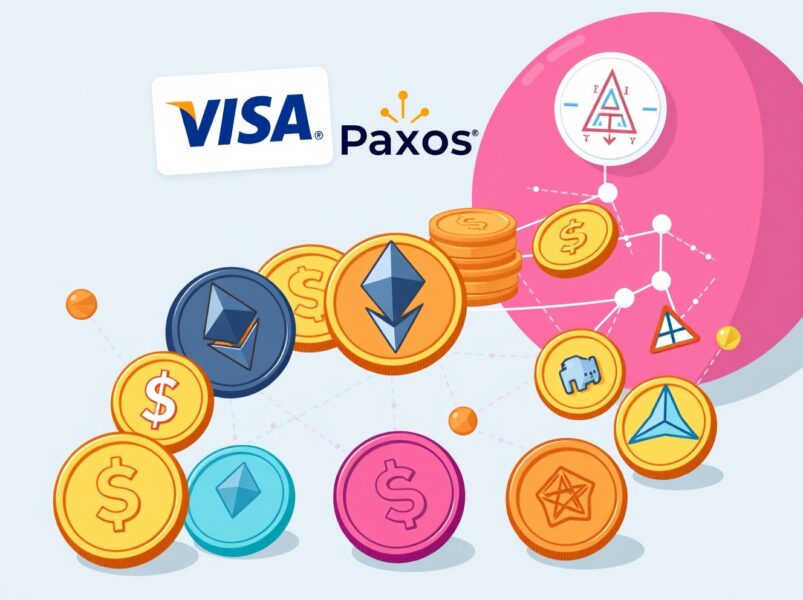Zero Knowledge Proof: The All-in-One Holy Grail for Privacy & Scale. Get Ready for the Whitelist!
For years, the blockchain world has forced developers and users to make a difficult choice: speed or privacy? You could build on a high-performance network that exposed all your data or use a privacy chain that was slow and couldn’t support complex applications. This fundamental split has held the entire industry back, creating a landscape of compromises. Now, a project is set to end this division. Zero Knowledge Proof (ZKP) is an entirely new Layer 1 protocol built to be a complete, all-in-one solution. It combines a powerful scaling engine with a comprehensive privacy layer. The whitelist for this project will open soon, presenting a rare opportunity.
The Divided Landscape of Blockchain Technology
The current blockchain ecosystem is fragmented. On one side, you have networks built for incredible speed and throughput. They can handle a massive volume of transactions, making them suitable for gaming and high-frequency trading, but they offer little to no privacy. Every transaction and interaction is visible on a public ledger. On the other side are projects dedicated to user privacy and anonymity. These networks excel at shielding user data but often struggle with scalability and functionality. They are typically slower, more expensive to use, and lack the smart contract capabilities needed to build a rich ecosystem of decentralized applications. This forces builders to choose one critical feature at the expense of another, limiting what’s possible.
A Unified Protocol for a New Generation
Zero Knowledge Proof (ZKP) was designed to eliminate this compromise. It is the first project to natively integrate high-performance scaling and absolute privacy into a single, cohesive Layer 1 protocol. It doesn’t treat these features as separate add-ons; they are part of its core architecture. By using a combination of cutting-edge zk-SNARK and zk-STARK technologies, the network achieves what was previously considered impossible.
- High-Performance Scaling: It functions as a powerful engine capable of processing tens of thousands of transactions per second, thanks to solutions like zk-Rollups and parallel computation.
- Comprehensive Privacy: It operates as a complete privacy layer, shielding transaction details, user identities, and smart contract inputs from public view.
This dual capability makes it a “category-killer,” offering a single platform that does it all without sacrificing performance or security.
The End of the “Speed vs. Privacy” Compromise
The implications of this unified approach are profound. For developers, it means no longer having to choose between building an application that is fast or one that is private. With Zero Knowledge Proof (ZKP), they can create dApps that are both. This opens the door to a new generation of use cases that were impractical before: think fully private DeFi protocols where your strategies remain confidential, verifiable identity systems that don’t expose personal data, and complex gaming economies where in-game assets and transactions are secure and secret. Why would a developer build on a specialized chain that only solves half the problem when a single protocol offers a complete, integrated environment? This makes specialized networks appear obsolete.
The Whitelist: An Opportunity for Early Access
The upcoming whitelist for Zero Knowledge Proof (ZKP) is more than just an early entry point; it’s a chance to secure your place in a network designed to be the future-proof foundation for decentralized systems. Think of it as an opportunity to pre-purchase the bandwidth of tomorrow’s unified digital world before it experiences mass adoption. As developers and users migrate away from fragmented, single-purpose chains toward this all-in-one solution, the demand for its unique, combined capabilities is expected to grow. Securing a spot through the whitelist, which will be opening soon, means positioning yourself ahead of this curve. It’s a rare chance to get in on the ground floor of a project that isn’t just a feature, but a complete solution.
A Unified Future, Built on an Uncompromised Protocol.
Zero Knowledge Proof (ZKP) represents a fundamental shift in how blockchain networks are designed. By refusing to compromise, it delivers a single, holistic protocol that is both a high-speed scaling engine and a robust privacy shield. This all-in-one design makes it a uniquely powerful platform for building the next generation of decentralized applications. It addresses the core fragmentation that has limited the industry’s potential, offering a unified foundation for developers and users alike. The whitelist is set to open soon, providing an early opportunity to participate in a project that aims not just to compete, but to create an entirely new category for itself.
Find Out More about Zero Knowledge Proof:
Website: https://zkp.com/
This publication is sponsored. Coindoo does not endorse or assume responsibility for the content, accuracy, quality, advertising, products, or any other materials on this page. Readers are encouraged to conduct their own research before engaging in any cryptocurrency-related actions. Coindoo will not be liable, directly or indirectly, for any damages or losses resulting from the use of or reliance on any content, goods, or services mentioned. Always do your own research.
The post Zero Knowledge Proof: The All-in-One Holy Grail for Privacy & Scale. Get Ready for the Whitelist! appeared first on Coindoo.
You May Also Like

Warsaw Stock Exchange lists its first Bitcoin ETF

Revolutionary Visa Stablecoin Integration: Unlocking New Payment Frontiers with Paxos

